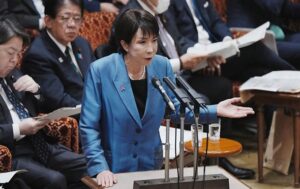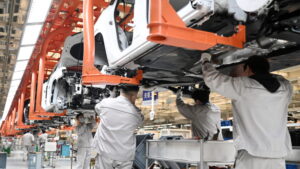
The first dealership center of the new premium brand of electric and hybrid cars Avatr, which enters the Ukrainian market, was opened on Stolichnoye highway in Kiev by the official distributor of the new brand – Atlant Motors Ukraine LLC (part of the Atlant Motors group of companies), the press service of the company reported.
The official presentation of the brand took place on November 20. “Atlant Motors Ukraine” will provide a full cycle – from car sales to service, warranty of the manufacturer and sale of original spare parts.
“Atlant Motors Ukraine” informs about plans to expand the network of official dealer centers in different regions of Ukraine. In particular, by the end of this year there will be official dealers in Odessa, Kiev, Kharkov, and in 2026 AVATR brand showrooms will be opened in Lviv and Dnipro.
At the official opening three models of the brand were presented, in particular Avatr 07 – urban mid-size hybrid or electric SUV. The car is offered in two variants: all-electric (BEV) and series hybrid (REEV). The REEV version is equipped with a hybrid setup based on a 1.5-liter turbo engine and electric motors with a total output of up to 492 hp.
Atlant Motors Group of Companies has been operating in the Ukrainian market for more than 20 years and represents, in particular, the Renault brand in Kharkov and Kharkov region. The group also includes Atlant Motors Energy (Kharkiv) – one of the largest suppliers of electric cars from China to Ukraine, which, according to YouControl data, has net income of UAH 619.9 million in 2024 and UAH 1.28 billion in January-September 2025.

China is deploying a large fleet of civilian cargo ships and ferries in exercises off its coast, rehearsing scenarios for a possible landing in Taiwan, according to a Reuters investigation based on satellite images and ship tracking data.
According to Reuters, in the summer of 2025, at least 12 civilian vessels — six car ferries and six deck cargo ships — took part in landing maneuvers on a beach near the town of Jieshen in Guangdong province. Satellite images captured the unloading of hundreds of military vehicles directly on the coast via ramps, without the use of port infrastructure.
Experts interviewed by the agency note that the civilian fleet could be a key element in a possible operation against Taiwan: according to current estimates, the PLA Navy and Marine Corps currently have enough of their own landing ships and boats to transport approximately 20,000 troops with equipment. The investigation indicates that the use of civilian vessels is part of a broader “shadow fleet” strategy, which allows the PRC to dramatically increase its landing and transport capabilities while simultaneously complicating the situation for the US Navy.
The investigation indicates that the use of civilian vessels is part of a broader “shadow fleet” strategy that allows the PRC to dramatically increase its landing and transport capabilities while making it more difficult for intelligence to assess the scale of preparations. According to Reuters, more than 100 civilian vessels have been tracked that are involved in military exercises or belong to companies that regularly participate in such maneuvers.
The article cites assessments by former Taiwanese Armed Forces Commander Li Shimin and other military experts who call the rehearsal of landings involving the civilian fleet a “significant step” toward the formation of real invasion plans. At the same time, Taiwanese officials point to the vulnerability of such ships to anti-ship and portable missiles and view the demonstrative exercises as part of a “cognitive war” aimed at putting psychological pressure on Taipei and its partners.
Reuters emphasizes that, despite the build-up of capabilities, it remains unclear whether the PLA is ready for a real amphibious operation across the Taiwan Strait: the scale of the invasion is difficult to conceal, and weather conditions, the island’s coastal terrain, and the potential response of the US and its allies make such a scenario extremely risky.
Reference from Experts Club: Comparison of the military capabilities of China and Taiwan (estimates for 2025)
According to open estimates (GlobalFirepower, Taiwan Ministry of Defense, budget data): Number of active military personnel
China: approximately 2.0–2.1 million (active PLA personnel).
Taiwan: nearly 230,000.
Ratio: approximately 8–9 to 1 in favor of China.
Reserves and mobilization resources
China: approximately 510,000 reservists + large paramilitary formations.
Taiwan: approximately 2.3 million reservists with a significantly smaller population, relying on mass reserves.
Air Force (general aviation)
China: about 3,300 aircraft, including about 1,200 fighters.
Taiwan: about 760 aircraft, about 280–300 fighters.
Fighter ratio: about 4–5 to 1 in favor of China.
Navy (combat ships)
China: about 750 ships and boats, including 3 aircraft carriers, dozens of destroyers and frigates, and over 60 submarines.
Taiwan: about 100 ships and boats, no aircraft carriers, with a limited number of destroyers, frigates, and submarines.
Ratio of fleet units: approximately 7–8 to 1 in favor of China, with an even more significant gap in total tonnage.
Defense budgets (2025)
China: approximately $245–270 billion per year according to official data.
Taiwan: approximately $20–21 billion (about 2.45% of GDP).
Ratio: China spends more than 10 times more on defense than Taiwan.
These figures are estimates based on open sources, but they generally reflect China’s significant quantitative advantage, while Taiwan focuses on technological saturation, defense doctrines, and alliances with the US and other partners.
Source: https://expertsclub.eu/kytaj-zadiyuye-czyvilni-sudna-v-navchannyah-po-tajvanyu-zmi/

On Thursday, the Chinese Ministry of Commerce said that Japanese Prime Minister Sanae Takaichi’s remarks on Taiwan had a negative impact on Sino-Japanese economic relations.
“Prime Minister Takaichi’s erroneous remarks on Taiwan, made in public, have fundamentally undermined the foundation of China-Japan relations and seriously damaged bilateral economic and trade ties,” Western media quoted ministry spokesman He Yongqian as saying.
“If the Japanese side continues to take such actions and continues to move in the wrong direction, China will resolutely take the necessary measures, and all the consequences will fall on Japan,” she promised.
The media reminds us that China is the second most important market for Japan. In 2024, according to the UN, China purchased $125 billion worth of Japanese goods, mainly industrial equipment, semiconductors, and automobiles.
In November, Takaichi said that an emergency situation around Taiwan involving the use of force could escalate into a “situation that threatens Japan’s survival”; the Kyodo news agency explained that in such a case, Tokyo could resort to its right to collective self-defense.
However, the Chinese authorities consider the Taiwan issue to be an internal matter for China and called on Takai to retract his statements. As a result, Beijing urged its citizens to avoid traveling to Japan and recommended that those wishing to study in that country reconsider their decision in light of the security situation. The Kyodo news agency also reported, citing a source, that China had informed Japan of the suspension of imports of Japanese seafood
. On Thursday, US Ambassador to Japan George Glass condemned these measures by the PRC and called them “economic coercion.” After meeting with Japanese Foreign Minister Toshimitsu Motegi, he assured that the US is committed to ensuring Japan’s defense, including the Diaoyu Islands (Japanese name: Senkaku) in the East China Sea, which are controlled by Tokyo. The islands are the subject of a territorial dispute between Japan and China.
According to Kyodo, 64-year-old Takaichi is known for her “hardline views on security.” In particular, she advocates revising Article 9 of the 1947 Japanese Constitution, which renounces militarism. She is also considered a supporter of ultra-right and nationalist views.
The Taiwan issue arose in 1949 when the People’s Republic of China was proclaimed and part of the Chinese Kuomintang party settled on the island of Taiwan, naming it the Republic of China on Taiwan. Beijing insists on the “one China principle,” according to which it is impossible to recognize both the PRC and the Republic of China on Taiwan at the same time. At the same time, some states have unofficial cultural and economic offices of Taipei.

In October this year, Ukrainians purchased 3,114 thousand passenger cars imported from China, which is 2.6 times more than in the same month last year, according to UkrAvtoprom on its Telegram channel.
It is noted that most of the passenger cars purchased from China were new — 2,512 units, which is 2.6 times more than last year. Demand for used cars also increased more than 2.6 times — 602 units were imported.
The vast majority of passenger cars from China were electric vehicles – 92%.
The most popular models of new passenger cars of Chinese origin were Volkswagen ID.UNYX – 441 units; BYD Song Plus – 391 units; BYD Leopard 3 – 261 units; Zeekr 7X – 169 units; BYD Sea Lion 07 – 150 units.
The most frequently purchased used cars were Zeekr 001 – 57 units; BYD Sea Lion 07 – 45 units; Volkswagen ID.UNYX – 36 units; Zeekr 7X – 33 units; and Audi Q4 – 30 units.
As reported, in January-October of this year, China was among the top three countries from which Ukraine imported passenger cars after Germany and the United States, with a share of 13.8% of total imports or $663 million, while in the same period of 2024, it was not among the top three.
In 2024, Ukrainians purchased about 14,400 cars imported from China, which is 18% more than in 2023. Demand for new cars grew by 37% to 11,000 units, while demand for used cars fell by 20% to 3,300 units.
In addition, according to UkrAvtoprom, in October 2025, Ukrainians purchased more than 5,800 used cars imported from the United States, which is 2.2 times more than in the same period of 2024.
The largest share of this number (49%) was electric cars, while gasoline cars accounted for 36%, hybrids – 8%, diesel cars – 4%, and cars with LPG systems – 3%.
The average age of the used American cars that joined the Ukrainian car fleet in October was 5.2 years.
The five most popular used cars manufactured in the US were Tesla Model Y – 900 units; Tesla Model 3 – 841 units; Ford Escape – 408 units; Nissan Rogue – 273 units; Tesla Model S – 270 units.

According to Serbian Economist, the Chinese company Techron Automotive plans to build its first foreign plant for the production of plastic car components in the city of Inđija (Vojvodina, Serbia), which will strengthen the country’s role as a regional hub for the automotive industry. This was announced by the Municipality of Inđija, as cited by Serbia-business.eu.
The construction is planned to start by the end of this year. According to the published information, the plant in Indjija will be the first Techron plant outside China. At the first stage, the construction of a 4.5 thousand square meters production building is envisaged. After reaching full capacity, the enterprise will be able to provide about 200 jobs.
The plant is scheduled to open in mid-2026.
Techron produces components for the world’s leading automakers – Volkswagen, Porsche, Audi, Chery, Geely and others. The product line includes engine and transmission parts, interior and exterior components, as well as control system components.
Experts note that the project fits into Serbia’s strategy of deepening specialization in the automotive industry and automotive components: dozens of plants for the production of harnesses, electronics and plastic parts for European and Asian brands are already operating in the country. For the region, this means not only new jobs, but also the need to invest in energy, logistics and vocational education in order to consolidate the effect of the new investor.
https://t.me/relocationrs/1782

China’s actual gold purchases this year may exceed officially declared volumes by several times and have already become one of the key drivers of record growth in precious metal prices, the Financial Times writes, citing analysts and market data.
According to official statistics from the People’s Bank of China, in 2025 the regulator purchased only about 25 tons of gold, with an increase in reserves of approximately 2 tons in some months. However, analysts at Société Générale, assessing trade flows of large bars and import data, believe that Beijing’s actual purchases could reach up to 250 tons per year, or more than a third of the total demand of global central banks. According to their estimates, actual purchases may exceed the officially disclosed figures by ten times or more.
Bruce Ikemizu, director of the Japan Precious Metals Market Association, said that market participants this year “practically do not believe official statistics, especially for China,” and estimates the country’s current gold reserves at nearly 5,000 tons — about twice the level reported publicly by the Chinese authorities.
According to the FT and experts, a significant portion of purchases are made opaquely — through the State Administration of Foreign Exchange (SAFE), the sovereign wealth fund China Investment Corporation, and other entities that are not required to publish detailed reports on gold reserves. This makes it difficult to assess the real scale of operations and increases market uncertainty.
Analysts note that the secretive accumulation of gold is linked to a strategy of de-dollarization. “China is buying gold as part of its strategy to reduce its dependence on the dollar,” the press quotes Jeff Currie, a strategist at Carlyle, as saying. Gold is seen as a hedge against currency and geopolitical risks, including against the backdrop of tensions with the US.
According to estimates by the World Gold Council, over the past decade, the share of gold in the international reserves of countries outside the US has grown from about 10% to 26%, making the metal the second most important reserve asset after the US dollar. Large-scale purchases by central banks have helped push the price of gold above $4,300 per troy ounce, according to the FT and industry publications.
China remains the world’s largest producer and consumer of gold, accounting for about 10% of global production, which allows Beijing to increase its reserves not only through imports but also through the domestic market.